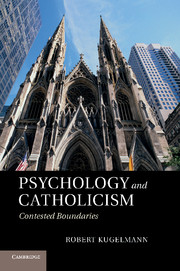Book contents
- Frontmatter
- Contents
- Acknowledgments
- 1 An introduction
- 2 The major fault line: modernism and psychology
- 3 Neoscholastic psychology
- 4 Psychology as the boundary: Catholicism, spiritualism, and science
- 5 Psychoanalysis versus the power of will
- 6 From out of the depths: Carl Jung's challenges and Catholic replies
- 7 Institutionalizing the relationship
- 8 Humanistic psychology and Catholicism: dialogue and confrontation
- 9 Trading zones between psychology and Catholicism
- 10 Crossings
- References
- Index
2 - The major fault line: modernism and psychology
Published online by Cambridge University Press: 05 July 2011
- Frontmatter
- Contents
- Acknowledgments
- 1 An introduction
- 2 The major fault line: modernism and psychology
- 3 Neoscholastic psychology
- 4 Psychology as the boundary: Catholicism, spiritualism, and science
- 5 Psychoanalysis versus the power of will
- 6 From out of the depths: Carl Jung's challenges and Catholic replies
- 7 Institutionalizing the relationship
- 8 Humanistic psychology and Catholicism: dialogue and confrontation
- 9 Trading zones between psychology and Catholicism
- 10 Crossings
- References
- Index
Summary
The two deepest characteristics of the new order are the scientific spirit and the democratic movement – a new conception of truth and a new conception of authority and government.
George Tyrrell (1908), Medievalism, p. 120This chapter explores the narrative of modernism that has pervaded the debates between psychology and religion, particularly Christian religion, over the past century. For Freud, psychoanalysis was the logical successor of religion, because it provided a rational grounding for mental health and moral action. For some Christians, psychology (and of course psychoanalysis) is an ersatz religion, founded by people disenchanted with religion and hostile to the notion of divine revelation. Many of the founders of experimental psychology, of psychoanalysis, and of humanistic psychology, were modernists. In Catholic circles, modernism is now an old charge, stemming from controversies internal to the Church in the early twentieth century. These controversies culminated during the reign of Pope Pius X, who sought to defend the faith from subversion by the modernists within the Church. Given the Church's embrace of the modern world during the Second Vatican Council, especially its openness to the human sciences, it might seem a dead issue, but in recent decades charges of modernism have persisted. Indeed, some non-Catholic Christian psychologists have even joined the chorus and accused psychology of modernism. To address this perceived flaw, we see Christian counseling and Christian psychology programs, accompanied by criticisms of the secularist assumptions of mainstream psychology.
- Type
- Chapter
- Information
- Psychology and CatholicismContested Boundaries, pp. 32 - 65Publisher: Cambridge University PressPrint publication year: 2011



